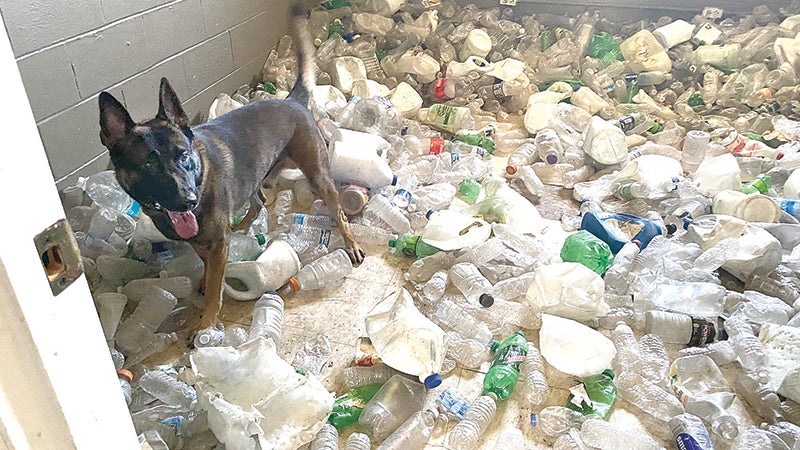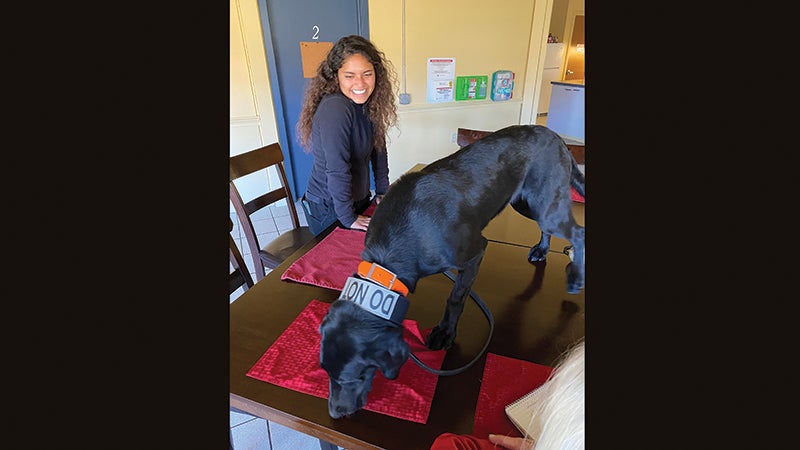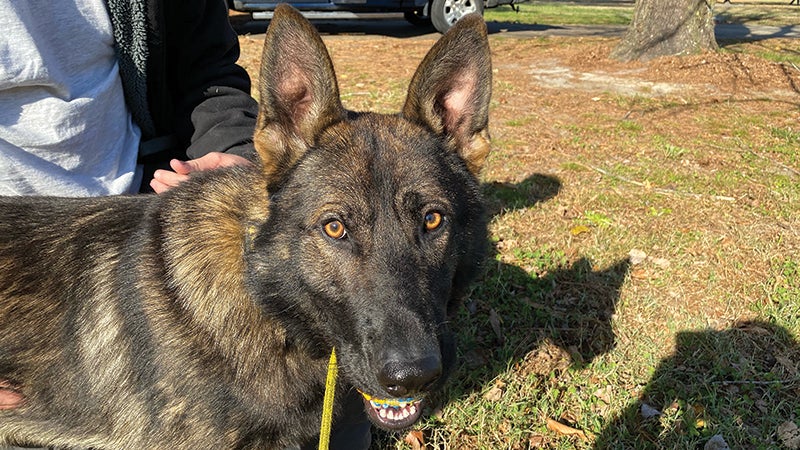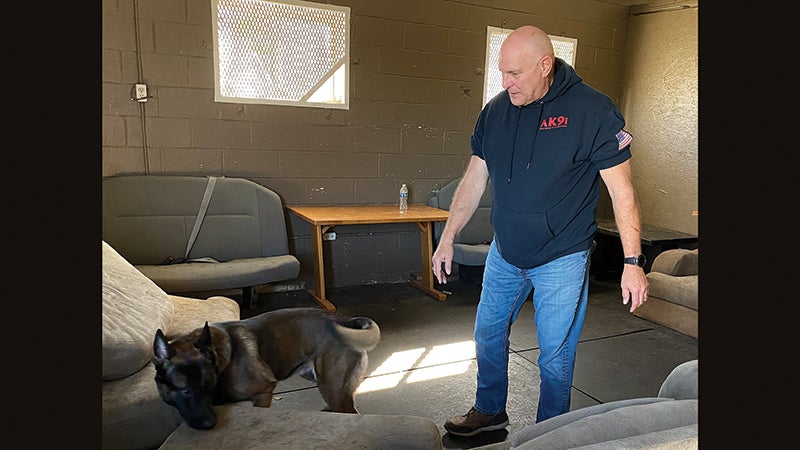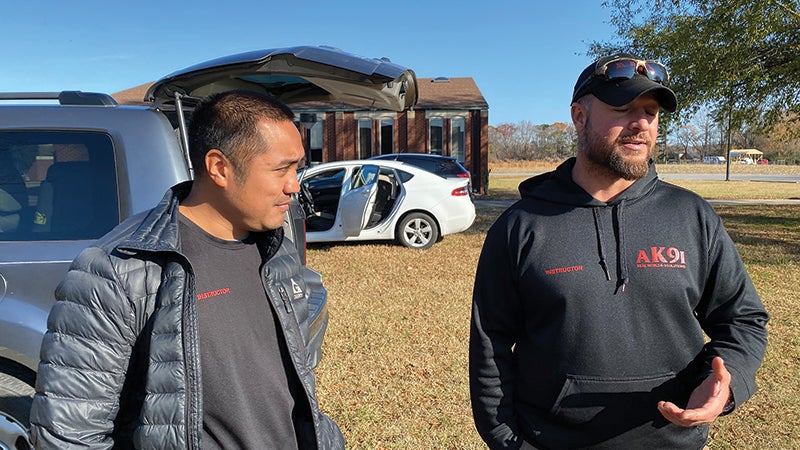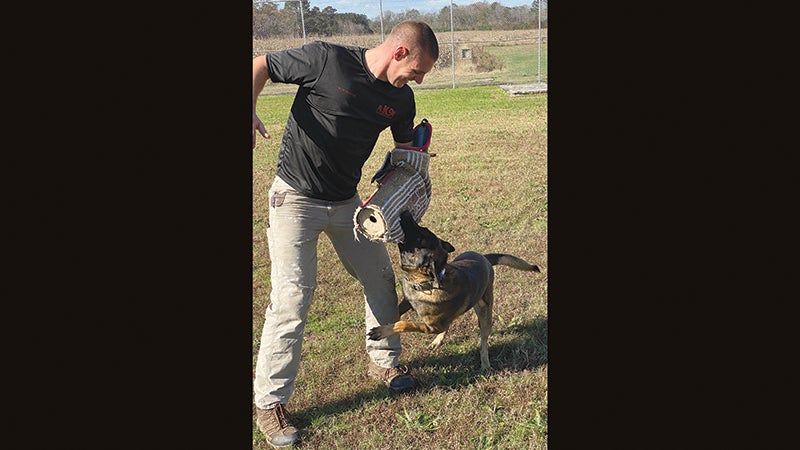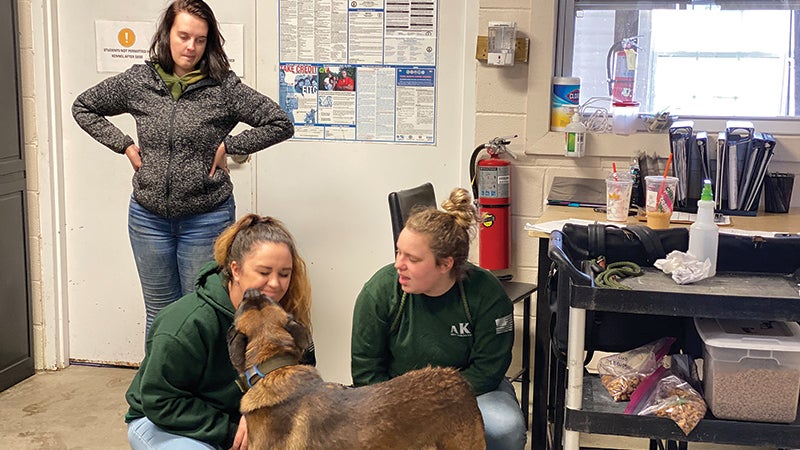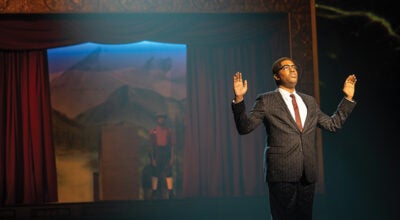The nose knows
Published 1:20 pm Wednesday, March 31, 2021
Story by Phyllis Speidell
Photos by John H. Sheally II
As the news chronicles riots, drug busts, bomb threats, terrorist attacks and school incidents, specially trained canines and their handlers are filling a larger role in protection, detection and security.
Tucked into rural Carrsville and Zuni, AK9I, a unique educational facility, offers career training in the growing field of canine-assisted security.
Paul Roushia, a U.S. Navy veteran and experienced dog handler, is president and co-owner of AK9I, American K-9 Interdiction, LLC, a training facility that works with dogs and humans who, in matched pairs, master an array of security skills for high-risk environments. Nigel Rhodes, a businessman originally from West Yorkshire, England, is AK9I’s chief operating officer and co-owner.
Both men see AK9I’s mission as training individuals and dogs for a new career, one that, in the case of veterans, builds on their military background. Most of the students, Roushia said, are in their 20s and include military veterans, active military members and law enforcement officers as well as civilians aiming for a career in law enforcement or commercial security work.
Roushia noted that Virginia has approved AK9I to provide professional canine-focused education and training services under the G.I. Bill, a plus for many of the students.
AK9I pairs students with a handpicked dog — generally a German shepherd, retriever, Belgian Malinois or Dutch shepherd — with whom they bond and When the course is completed, the student and dog graduate together, ready to work. While much of the training is on the Carrsville campus, some training utilizes unique settings such as the USS Wisconsin, a retired World War II battleship permanently moored in Norfolk.
In 2018, AK9I bought the former HumanKind Presbyterian Home in Zuni as an additional campus to house students and hold classroom training, meetings and more.
Sandra Garduno, a former Marine Corps public affairs specialist from Alexandria, grew up with rescue pit bulls and feels a strong connection with canines. When she left the Marines in 2018, she worked in a canine day care facility and realized she loved teaching dogs. She came to AK9I to train for a new career, taking a 13-week handler course and graduating with an explosive detection dog, Dozier.
“I love the structure in this field that is so similar to the military,” she said. “You have to hold the dog accountable.”
When Dozier was no longer able to work, Garduno came back to AK9I for an additional eight weeks of training in detection and obedience and met her new dog, Indie, a 50-pound, 1 ½-year-old black Lab. Now she and Indie work contract jobs for a New York security company. When she and Indie worked an event at Lincoln Financial Field, the home of the Philadelphia Eagles, she was happy, she said, to see that Indie’s “people personality” blended well with her “high work drive in scanning rooms and people.”
Roushia half-jokingly described the 57-acre Carrsville campus as looking like a CIA compound. The property is maintained with well-swept military order. A large, permanent tent structure houses administrative offices while a variety of outbuildings serve as training facilities. Some of the buildings have been repurposed from the property’s former life as a prison and, later, a juvenile detention facility.
From 1954 to 1991, the Nansemond Correctional Unit #3 occupied the site. The minimum-security work camp held state prisoners who built roads while awaiting release. From early 1996 through 2000, Virginia Juvenile Boot Camp, also known as Camp Washington, operated there as a rehabilitation center for 45 non-violent juvenile offenders.
Rhodes came to the United States two days before the terrorist attacks of Sept. 11, 2001, and settled in Florida. Looking for a career change, he was interested when he learned about AK9I’s training for explosive detection dog handlers. He visited the facility, met the former owner and signed on in a management position instead.
Roushia, originally from Racine, Wis., was a Navy parachute rigger before completing military police training and serving as a dog handler for a decade. When he retired from the Navy in 2000, Roushia enrolled in the San Diego Police Academy. He was a Chula Vista street cop for a year and then security director at the Naval Air Depot, North Island, for three years. At a conference in Las Vegas, Roushia met the original owner of AK9I and joined the firm as a master trainer. When the owner ran into legal difficulties, Roushia left to first work at a dog training facility in Virginia Beach and then to open the James River Boarding Kennels in Carrollton.
When the former owner was forced to sell, Roushia and Rhodes bought AK9I and, in 2009, bought the Carrsville property that the state had declared surplus. There, at the request of the Marine Corps, Roushia and his staff trained 300 IED detection dogs and 500 handlers.
In 2010, AK9I started a $1 million renovation on the property that enabled the business to move from Carrollton to Carrsville. Mindful of the impact of the International Paper Mill’s closure on the area’s labor force, the pair pledged to use all local contractors for the renovation.
While some of the original buildings were re-purposed, AK9I also built a kennel with a 200-dog capacity, bordered it with an earthen berm topped with trees and shrubs to mitigate noise, and fenced the entire property.
American K-9 Interdiction’s mission is to produce expertly trained canines — and equally well trained handlers — to protect and save lives. Roushia and Rhodes have seen instances where the life saved can be that of the dog’s handler who may be a veteran recovering from combat trauma or other mental/emotional difficulties.
Gary Koda, 31, a former ship’s officer, was medically discharged from the Navy in 2018 after 12 years of service including a stint in the Marines and four years at the U.S. Naval Academy, Annapolis. Unemployed since 2018, he works to restore his combat-traumatized mental health. After working with a compensated VA work therapy program, he is now at AK9I, training with Nandy, his canine partner, in narcotics detection and tracking.
Koda is an outspoken advocate for the AK9I training programs and the impact they have.
“Some days are still terrible, but I’m feeling more confident and my best hope is that confidence builds toward stability,” he said. “I don’t really connect to dogs, but dogs connect to me.”
AK9I has had to overcome a few hurdles, including a cease and desist order from the county when a training firing range was installed on the campus to also familiarize the dogs with gun fire. An explosive storage magazine for detection work, albeit with full security and no detonation, also raised a few initial concerns.
The dogs remain the keystone of AK9I’s multiple training programs.
“There’s no other technology in the world that proves to be as reliable and efficient as a dog,” Roushia said, adding that dogs can be taught to detect 23 explosive odors and five narcotic odors.
Accordingly, AK9I hopes to initiate a training program for COVID-19 detection dogs, another way canines and their human partners can save lives.


